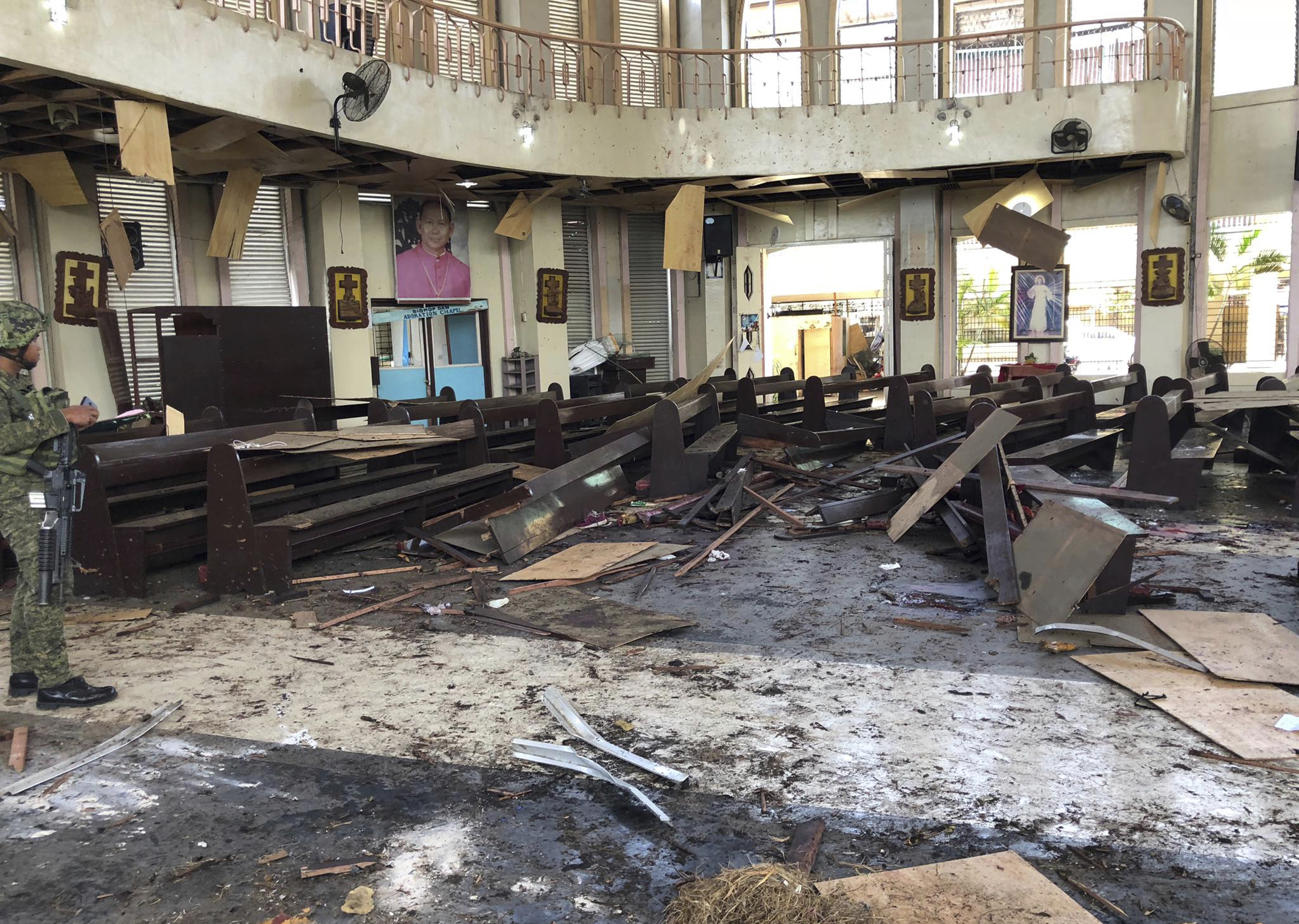
In this photo provided by WESMINCOM Armed Forces of the Philippines, a soldier views the site inside a Roman Catholic cathedral in Jolo, the capital of Sulu province in the southern Philippines after two bombs exploded Sunday, Jan. 27, 2019. The Philippine government says it will “pursue to the ends of the earth the ruthless perpetrators” behind bomb attacks that killed over a dozen people and wounded many more during a Sunday Mass at a cathedral on the restive southern island. (WESMINCOM Armed Forces of the Philippines Via AP)
MANILA, Philippines — The Armed Forces of the Philippines (AFP) has “limited ability” to gather and process intelligence information on its own to effectively fight terrorism, a recently released 2018 assessment report of the United States said.
According to the 5th Lead Inspector General quarterly report on Operation Pacific Eagle-Philippines (OPE-P), “the AFP had limited ability to collect information on a target and provide that intelligence to a unit on the ground to act on it.”
The counterterrorism mission OPE-P was quietly launched in 2017 when the Philippines was battling ISIS-linked militants in Marawi City. One of its primary objectives was to help improve the AFP’s Intelligence Surveillance Reconnaissance (ISR) capabilities against the local ISIS.
The US assistance continued even after five months of fighting in Marawi City, the worst security crisis of the Philippine government in recent years. Government forces’ battle against groups that have pledged allegiance to the Islamic State (IS) and other violent extremist organizations in Mindanao continue.
To fill in the gap, the US had been providing ISR assets and training to AFP personnel in counterterrorism operations.
The report said the Philippine military’s limited ISR capabilities were due to lack of assets, as well as institutional and infrastructure shortcomings.
“Because of these challenges, the AFP relies heavily on the DOD and its contractors’ ISR capabilities to identify the locations of suspected enemy activity and provide intelligence products for their use,” it said.
“…The desired end state is for the AFP to meet its own needs for ISR support to counterterrorism operations, including the capacity to target and conduct lethal operations against multiple violent extremist threats, without DOD (Department of Defense) assistance,” it added.
An assessment of the AFP’s progress was not included in the report, however, as the training has not yet concluded while the report was being made.
At a forum on Monday, Defense Secretary Delfin Lorenzana also mentioned the Philippine-US cooperation to combat terrorism.
This had been going on for some time, he said, even before the twin explosions in Sulu last week, which killed 23 people and wounded about a hundred. The Abu Sayyaf, a group that has pledged allegiance to the ISIS, were the main suspects behind the blasts.
The defense chief said the US has been deploying its drones and other air assets, as well as sharing intelligence information to track down terrorists.
Under the OPE-P, the US report said 86 US special operations forces and 185 US troops has so far been deployed in the Philippines, supported by 8 US contractors who provide transportation, security, and other services.
Another 458 local national subcontractors provided services, such as food preparation and general labor. One DOD (Department of Defense) civilian based here is in charge of the Philippine Operations Support Contract.
A total of 12 US aircraft, including 8 unmanned ISR platforms, 3 medium-lift helicopters, and 1 medium-lift airplane are in the Philippines for the counterterrorism mission, the report said. /kga